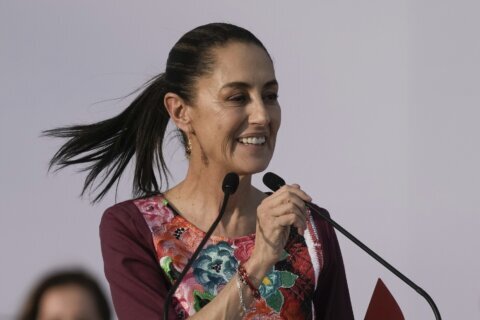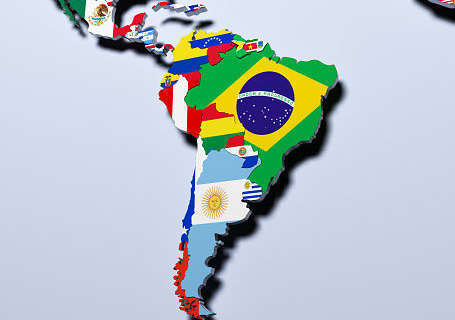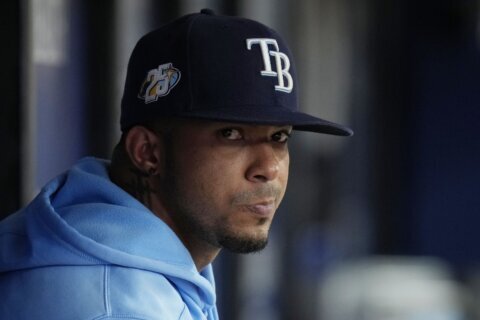SAN SALVADOR, El Salvador (AP) — In the narrow, gang-controlled alleys of the Las Palmas neighborhood, struggling Salvadorans are untroubled by actions of their president that so infuriate his critics.
They are not bothered by Nayib Bukele’s dictatorial maneuvers — sending armed troops into congress to coerce a vote, or ousting independent judges from the country’s highest court, paving the way to control all branches of government. They praise his relentless attacks on the politicians who governed El Salvador for nearly 30 years before him, and the elites who benefited from their rule.
In this neighborhood they are grateful for the boxes of food staples they’ve received from Bukele’s government during the pandemic. Adults proudly pat their shoulders and say they got both doses of the COVID-19 vaccine long before most other people in Central America.
For all the observers and critics who condemn a dangerous concentration of power by a charismatic leader who sports down-home blue jeans and leather jackets, Bukele enjoys an approval rating of more than 90% among people who saw three of four previous presidents jailed or exiled for corruption.
“They talk about democracy… I don’t know what else,” said Julio César López, 60, a street artist in Las Palmas. “It makes me really happy that they’re kicking out that class of people.”
Bukele’s presidency so far is the story of one of Latin America’s newest populist autocracies in the making: spending big to hand out goodies, branding opponents as enemies, raising the profile of the military. Like former President Donald Trump, Bukele prefers social media over press conferences, so he can control the message, though he does not miss a good photo op to brandish his image.
The president has convinced most Salvadorans that his government is on the move against poverty and gang violence, said Leonor Arteaga, program director at the Due Process of Law Foundation, a regional rule of law organization based in Washington. “No one can deny that he effectively has the support of the majority of the population and he is using that support and manipulating it to advance his agenda.”
The residents of Las Palmas say they recognize Bukele’s concentration of power and initially, at least, they seem willing to trade democratic ideals for short-term solutions to their yawning needs.
Rigoberto Castellanos, a 57-year-old construction worker in Las Palmas, says the previous opposition-controlled congress and ousted constitutional justices were thorns in Bukele’s side that needed to be removed.
He noted that currently El Salvador’s constitution bans re-election, but if that were to change, “who wouldn’t like to have the president for another five years?”
The 39-year-old Bukele, a non-ideological pragmatist, is the latest in a string of Latin American presidents from across the political spectrum who have used elections and their personal popularity to amass power.
Bukele’s office denied requests for an interview or to respond to questions and comment for this article.
For nearly three decades, El Salvador was ruled alternately by the conservative Arena party and the leftist Farabundo Martí National Liberation Front formed in the wake of El Salvador’s brutal civil war. But the parties failed to deliver. Arena and the FMLN both had presidents who plundered El Salvador’s coffers and left a society with few economic opportunities, besieged by powerful street gangs that extorted and killed with impunity.
Bukele, a former publicity executive, rose through the ranks of the FMLN from small town mayor to mayor of the capital, San Salvador, until the FMLN eventually booted him for refusing to toe the party line. It cemented his outsider status and he formed his own political party, New Ideas, winning the presidential vote in 2019.
While elections in El Salvador have been considered free, critics of Bukele say the country can no longer be described as a functioning democracy.
On Feb. 9, 2020. Bukele had been locked in battle with the opposition-controlled congress. He wanted lawmakers to approve funding for a security plan to control gangs, but they had refused to convene for a vote, saying they wanted more information.
On that Sunday, heavily armed police and soldiers in tactical gear entered the Legislative Assembly with Bukele. Hundreds of supporters Bukele had rallied to pressure lawmakers waited outside. Sharpshooters took up positions on rooftops. Bukele took the seat of the body’s president and prayed.
“If we wanted to press the button, we would press the button” and remove lawmakers from the legislature, he told supporters outside the building. “But I asked God and God told me: patience, patience, patience.”
A year later, New Ideas won a supermajority in legislative elections. On May 1, the first day the new lawmakers were seated, they voted to remove and then replace the five justices of the Supreme Court’s Constitutional Chamber, and the attorney general.
As the lawmakers prepared to vote, police surrounded the Supreme Court. A police patrol vehicle was parked outside the Supreme Court president’s home. The justices’ replacements, all with ties to Bukele or his party, were later escorted into the building by police.
Bukele was pleased. “I know that most of the Salvadoran people eagerly await the second session,” he said.
Arteaga said “El Salvador is in a process of building authoritarianism. It is very clear, there are all the signs.”
For the first two years of Bukele’s administration the constitutional justices had been a key check on his power. His critics described a sinking feeling, realizing that there would now be nowhere to turn.
Journalists, business people and others who criticize the administration are increasingly finding themselves under investigation or subject to audits.
El Salvador’s award-winning independent news outlet El Faro also has suffered public attacks by Bukele and his supporters, a government audit and its staff has reported being followed by strangers.
Last September, Bukele said on national television that there was an open money laundering and tax evasion investigation of El Faro. In January, the Inter-American Commission on Human Rights ordered El Salvador’s government to take steps to protect 34 members of El Faro’s staff and allow them to carry out their journalistic work.
Javier Simán, the president of El Salvador’s largest business association and an outspoken Bukele critic, said he has been subject to more than 100 government audits. His family owns a retail empire with its department stores in El Salvador and other parts of Central America, as well as other businesses.
Late on May 1, as international condemnation began to pour in over the ousting of the judges and attorney general, Bukele was defiant.
“To our friends in the international community: we want to work with you, trade, travel, get to know each other and help where we can,” he tweeted. “Our doors are more open than ever. But with all due respect: We are cleaning our house … and that is not your responsibility.”
Copyright © 2024 The Associated Press. All rights reserved. This material may not be published, broadcast, written or redistributed.







